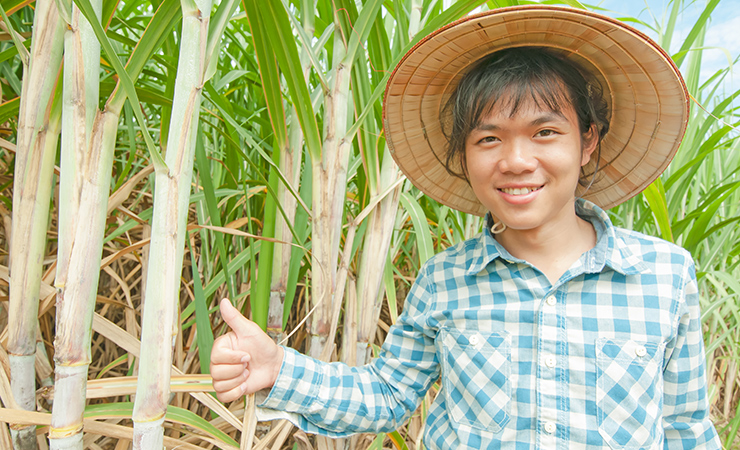Every month Fairtrade Canada puts the spotlight on one or more Fairtrade certified product categories. In April we indulge our sweet tooth by using Fairtrade sugar – whether in a cup of tea or coffee, or used to bake tasty treats. We also welcome the warmer weather with a scoop of Fairtrade ice cream.
Look for the FAIRTRADE Mark on your bag of sugar or pint of ice cream during Earth Month to be sure that your occasional indulgences are produced sustainably by farmers and workers in countries marginalized by trade.
Fairtrade and Sustainability
Sustainability means we can meet people’s needs today without compromising the needs of people in the future. For Fairtrade, this means building strong economies, healthy and just societies and living within the limits of what our environment can sustain.
Whether it’s taking action to improve incomes, training farmers to be more resilient to climate change or enabling communities to invest in education, Fairtrade empowers farmers and workers to face a range of economic, environmental and social challenges.
Fairtrade is also about supporting and challenging businesses and governments to make trade fair and inspiring shoppers to think more about what they buy.
To learn more about Fairtrade and Sustainability, watch this short YouTube video.
How Fairtrade Makes a Difference
- Protecting the environment – The Fairtrade Standards define environmental standards and promote training for farmers to encourage environmentally sustainable production.
- Raising living standards – Fairtrade farmers and workers are less vulnerable to price volatility, meaning reduced risk and improved income and food security.
- Improving productivity and quality –Farmers and workers can earn more from what they produce through technical support and investment in better farming practices.
- Stronger and inclusive businesses – Fairtrade promotes democracy, strong leadership and relationship-building with different markets, meaning that businesses become a more important part of the supply chain.
- Making life better for communities – The Fairtrade Premium is often used to fund education and healthcare projects, access to water, road building, and other investments in communities.
Fairtrade and the Sustainable Development Goals
The Sustainable Development Goals (SDGs), also known as the Global Goals, are a new set of targets which aim to end poverty, fight inequality and injustice, protect the environment and tackle climate change. They follow on from the UN Millennium Development Goals, which expired at the end of 2015.
Fairtrade can play a part in achieving most of these goals, as they are closely interlinked. Here are just some that are key for Fairtrade:
- Goal 1: End poverty in all its forms everywhere
- Goal 2: End hunger, achieve food security and improved nutrition and promote sustainable agriculture
- Goal 5: Achieve gender equality and empower all women and girls
- Goal 8: Promote sustained, inclusive and sustainable economic growth, full and productive employment and decent work for all
- Goal 12: Ensure sustainable consumption and production patterns
- Goal 13: Take urgent action to combat climate change and its impacts
- Goal 16: Promote peaceful and inclusive societies for sustainable development, provide access to justice for all and build effective, accountable and inclusive institutions at all levels
- Goal 17: Strengthen the means of implementation and revitalize the global partnership for sustainable development

